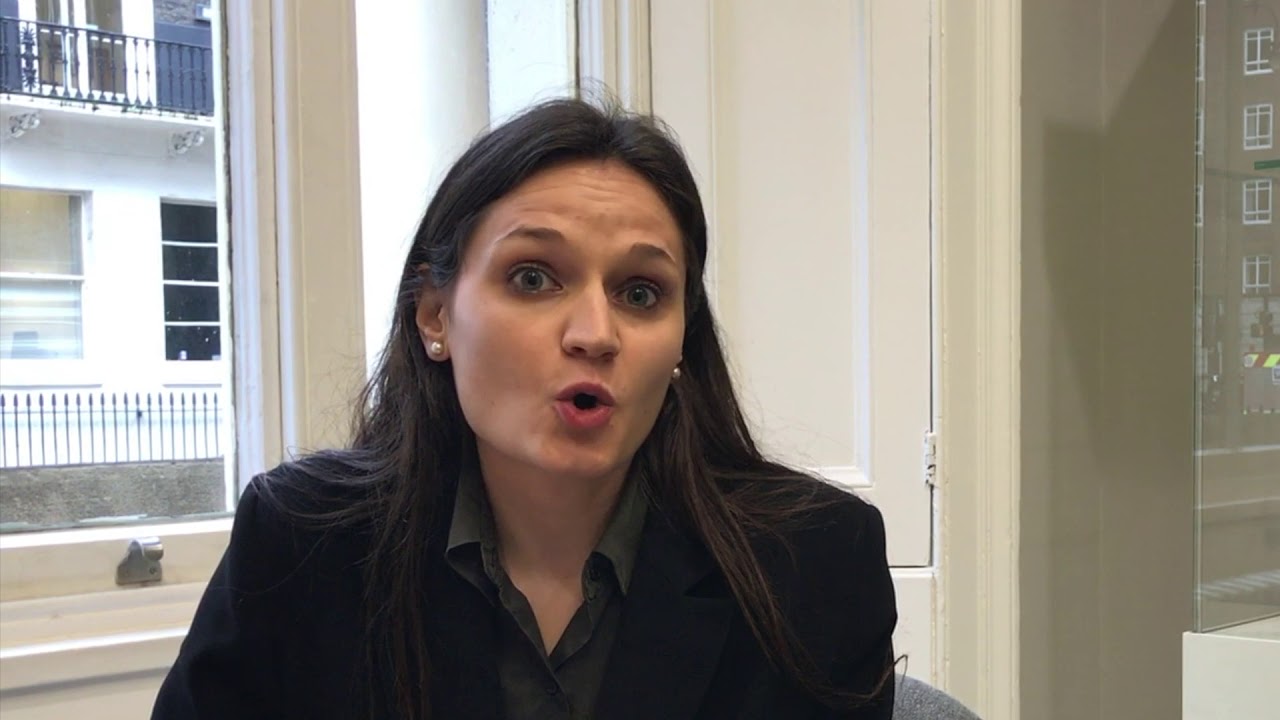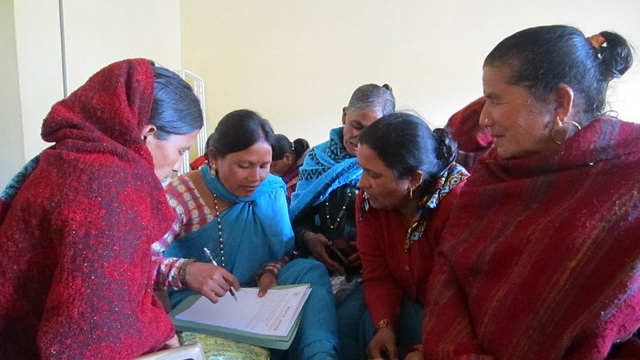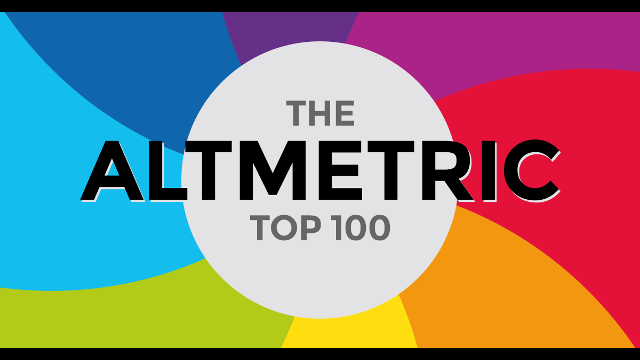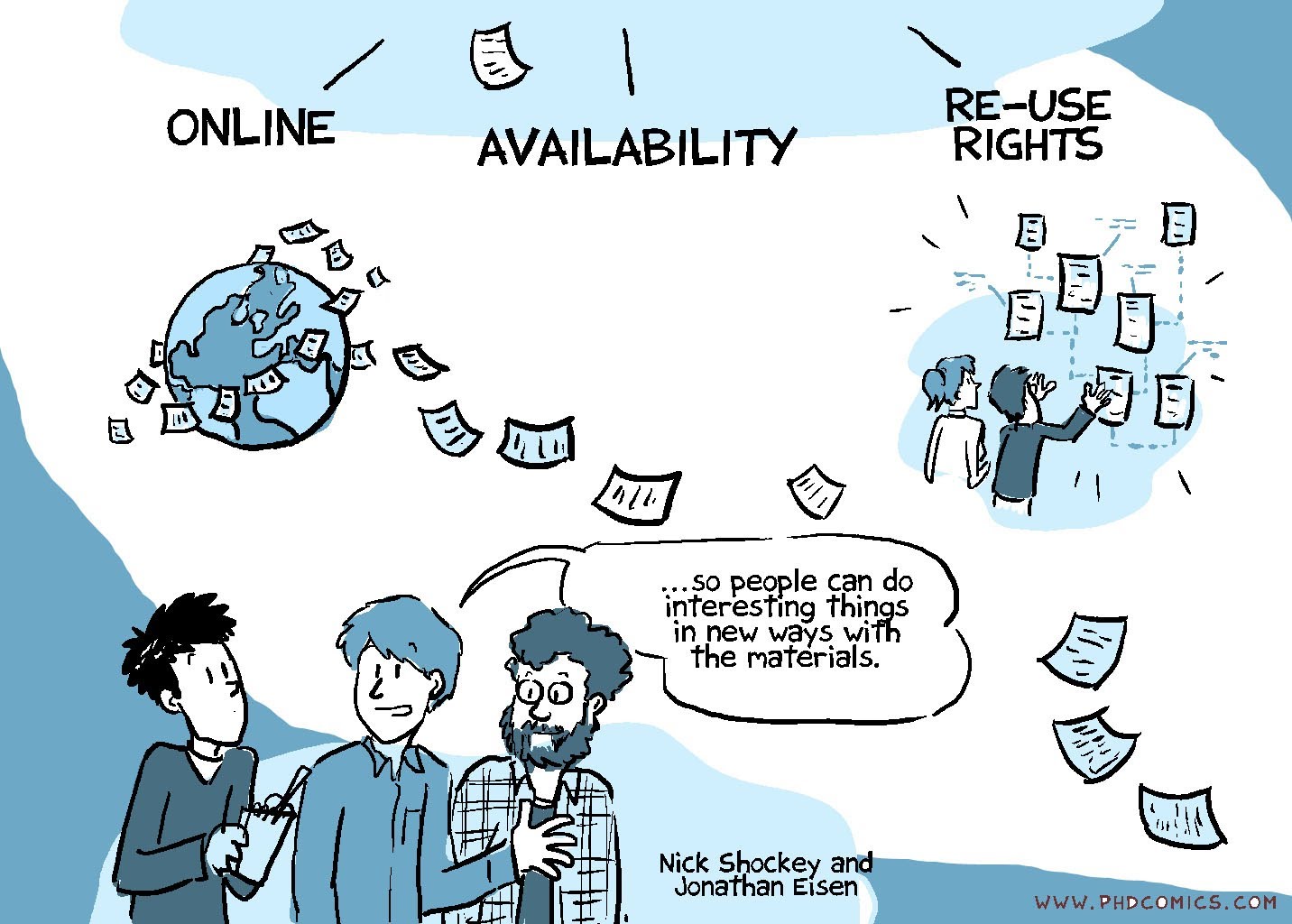
Open access trends: the good, the bad, and the irony
In the video above, Nick Shockey and Jonathan Eisen explain the fundamentals of open access publishing. The free and immediate online access to academic literature is vital if people are to be able to make the best evidence-based decisions, so open access is a principle of RealKM Magazine, as we discuss in our editorial guidelines.
An article in Yahoo! Finance reports on predicted trends in open access publishing in 2017, sourced from two recent reports: Open Access Journal Publishing 2016-2020 and Open Access Book Publishing 2016-2020. If you’ve followed those report links you’ll have immediately seen the stark irony: access fees starting at USD $1,875 for publications on open access trends! Such fees are beyond the reach of small organisations, and even large organisations in developing countries, so if Yahoo! hadn’t paid the fees and published a summary article then we are unlikely to have ever been aware of the existence of the reports, let alone their contents. And all we have now is a brief summary – it would have been much better to have been able to read the reports in full.
Three trends from the reports are identified in the Yahoo! Finance article:
- Institutions will tie their subscriptions to open access: Library consortia and multi-campus university systems are expected to use their subscription renewals to major journals as an opportunity to lobby for contractual assurances from commercial publishers for the advancement of open access.
- The predatory journal problem will continue to grow: The business model where authors or their institutions pay an article processing charge (APC) upon the acceptance of a paper has helped the growth of open access publishing. However, “it has also given rise to unscrupulous publishers that create an appearance of legitimacy, but do little more than collect APCs and post articles to the Web.”
- Publishers will warm to content sharing: Faced with the proliferation of sites that allow people to download articles for free, publishers are beginning to develop their own sharing policies. In 2016, two publishers launched trial programs enabling researchers to freely share peer-reviewed content, with more more publishers expected to follow in 2017.
60 German research institutions stand firm
An example of institutions that are tying their journal subscriptions to open access is a German project that is negotiating a nationwide license agreement with publisher Elsevier: “Its objective is to significantly improve the status quo regarding the provision of and access to content (Open Access) as well as pricing. It aims at relieving the institutions’ acquisition budgets and at improving access to scientific literature in a broad and sustainable way.”
To improve the negotiating position, over 60 major German institutions have initiated the cancellation of contracts with Elsevier. Elsevier came back with an offer at the end of 2016, but this was rejected for not complying with the principles of open access. As a result, negotiations were interrupted, and there is no access to Elsevier journal full texts from January 2017. However, despite this loss of access, the institutions are standing firm:
All participants in this process are aware of the imminent effects this has on research and teaching. However, they share the firm conviction that, for the present, the pressure built up by the joint action of many research institutions is the only way to to reach an outcome advantageous for the German scientific community.
A number of such outcomes have already been successfully negotiated. In February 2008, the German-based Max Planck Society negotiated an open access agreement with Springer Science+Business Media, and university systems in Sweden and The Netherlands have finalised arrangements with Springer Nature and Taylor & Francis respectively.
The rise in predatory publishing
Alex Gillis explores the problem of predatory journal publishing in an article in University Affairs. Unlike reputable journals, “predatory journals bombard academics with spam emails, accept almost all submissions and overstate the rigour of their peer-review processes. They also often conveniently neglect to mention publication fees until late in the process.”
However, authors are often willing participants in the scam, “publishing numerous articles in these questionable journals to earn quick and easy academic credit at their institutions.”
There are numerous legitimate open access journal publishers, for example the Public Library of Science (PLOS) and BioMed Central, and in the knowledge management space there is the Electronic Journal of Knowledge Management (EJKM).
But Gillis advises that in the past few years, the number of predatory journals has exploded. He references “Beall’s List”, a blacklist of potentially predatory publishers and journals maintained by Jeffrey Beall, an associate professor and librarian at the University of Colorado Denver. Five years ago, there were only 18 publishers on Beall’s List, but now it contains more than 1,200 publications and 1,000 publishers.
Junior academics in particular are getting duped by predatory journals due to their lack of experience. However, deceptive practices by predatory publishers are making it increasingly difficult for even vigilant academics to be able to identify dubious journals. These practices include using the names of well-known experts without their permission, copying the name or parts of the names of reputable journals, and buying out reputable publishers.
Worryingly, Jeffrey Beall has suddenly removed all of the information from his Beall’s List website, and his faculty page has also been taken down. The University of Colorado Denver has stated that it was Beall’s decision to pull the plug on his website, but his reasons for doing so are unknown. The site has caused considerable controversy, with Beall having faced legal threats in the past.
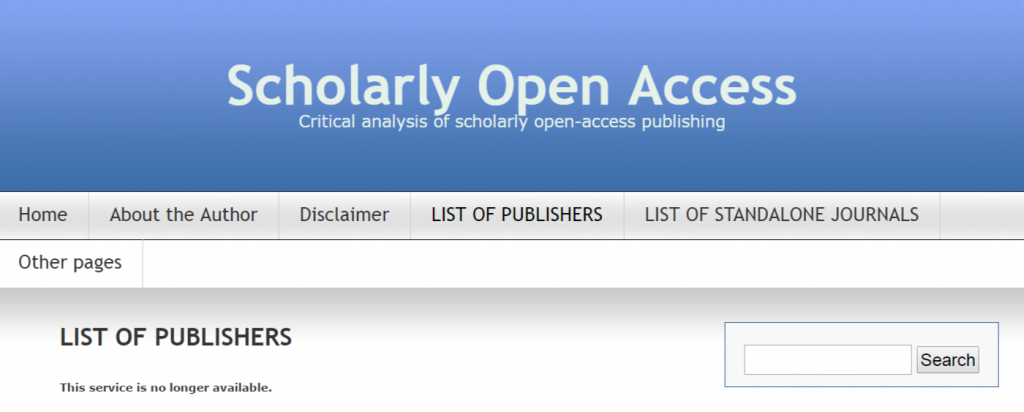
Related to predatory journals is the issue of predatory conferences. James McCrostie writes in Times Higher Education that:
All predatory conference organisers share some of the following characteristics. They hide their for-profit nature. They charge high fees (with minor presenters paying even more than non-presenters). They fail to carry out rigorous peer review of conference papers. They treat the “call for papers” deadline as flexible. And they list researchers’ names on advisory boards or committees without obtaining permission, to give themselves the appearance of legitimacy.
Rather than avoid predatory conferences, many academics from the UK, North America, Japan, continental Europe and Australia present papers at them, or even help to organise them. McCrostie is strongly critical of this, stating that “Those deceived once might be forgiven – although they should probably brush up on their critical thinking. But those offering their name, title and time to deliver keynote speeches and to help organise predatory conferences need to start blaming themselves.”
An example of journal content sharing
Springer Nature announced in October 2016 that it had completed rolling out its “SN SharedIt” content sharing initiative to its entire journal portfolio and over one thousand additional co-owned and partner-owned journals, following a successful trial.
SharedIt “enables authors and subscribers to post links to free-to-read versions of primary research articles anywhere, including social media platforms, repositories, websites, scholarly collaborative networks and via emails.”
Papers made openly accessible through the SharedIt initiative can be found among our selection of knowledge management related articles from the top 100 most-discussed articles of 2016. For example, Mastering the game of Go with deep neural networks and tree search.
Elsevier also initiated a sharing trial in 2016.
Also published on Medium.



